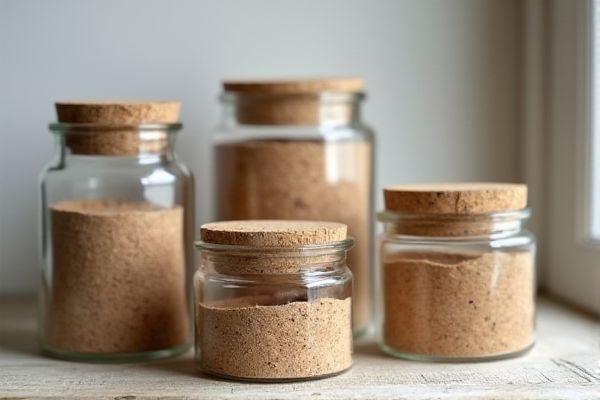
Cork jars provide a natural, airtight seal ideal for preserving freshness, while bamboo lid jars offer a sturdy, eco-friendly alternative with a sleek design and moisture resistance. Explore the rest of the article to discover which option best suits your storage needs and lifestyle.
Table of Comparison
| Feature | Cork Jars | Bamboo Lid Jars |
|---|---|---|
| Material | Natural cork, lightweight, porous | Eco-friendly bamboo, sturdy, smooth finish |
| Seal Quality | Moderate airtightness, natural compressibility | Better airtight seal with silicone ring |
| Durability | Prone to wear and cracking over time | High durability, resistant to moisture and cracking |
| Eco-Friendliness | Renewable, biodegradable but less durable | Sustainable, biodegradable, and long-lasting |
| Maintenance | Requires gentle cleaning, avoid soaking | Easy to clean, maintain with mild soap |
| Cost | Generally lower-priced | Typically higher cost due to material and features |
| Aesthetic Appeal | Rustic, natural look | Modern, polished appearance |
Introduction: Cork Jars vs Bamboo Lid Jars
Cork jars offer natural antimicrobial properties and excellent flexibility, making them ideal for airtight sealing and preserving freshness in food storage. Bamboo lid jars provide a sturdy, eco-friendly alternative with a smooth finish and often include silicone seals for enhanced leak resistance. Both options prioritize sustainability, but cork excels in biodegradability while bamboo offers greater durability and aesthetic appeal.
Material Composition and Sustainability
Cork jars feature lids made from the bark of cork oak trees, a renewable and biodegradable material renowned for its natural elasticity and water resistance. Bamboo lid jars utilize bamboo, a fast-growing grass that absorbs significant carbon dioxide, making it an eco-friendly alternative with high durability and lightweight properties. Your choice between cork and bamboo lids impacts sustainability by favoring renewable resources with minimal environmental footprints and supporting responsible harvesting practices.
Airtightness and Seal Effectiveness
Cork jars offer a natural, breathable seal that may not be fully airtight, making them ideal for storing dry goods that benefit from slight airflow. Bamboo lid jars often feature silicone or rubber gaskets, providing a tighter, more reliable airtight seal that preserves freshness by preventing moisture and air ingress. Your choice depends on whether you prioritize a traditional, eco-friendly seal or maximum airtightness for long-term food storage.
Aesthetic Appeal and Design
Cork jars offer a natural, rustic charm with their warm textures complementing earthy or minimalist decor, while bamboo lid jars bring a sleek, modern look with smooth finishes and subtle grain patterns. Both materials provide eco-friendly choices, but bamboo lids often have a polished, contemporary aesthetic that suits kitchens aiming for a clean, sophisticated style. Your choice between cork and bamboo lids should align with the overall design theme, balancing organic warmth against refined elegance.
Durability and Longevity
Cork jars offer moderate durability but may degrade faster when exposed to moisture and frequent handling, making them less ideal for long-term use in humid environments. Bamboo lid jars provide superior longevity due to bamboo's natural resistance to moisture, cracking, and warping, ensuring a tight seal and extended preservation of contents. Your choice will depend on the storage conditions, with bamboo lids generally favored for their enhanced durability and lifespan.
Ease of Use and Maintenance
Cork jars offer a snug, natural seal that is lightweight and easy to handle, making them convenient for frequent use. Bamboo lid jars provide a durable, water-resistant surface that is simple to clean and maintain, often requiring just a quick wipe to stay fresh. Your choice should consider cork's occasional need for drying to avoid mold versus bamboo's resilience against moisture and staining.
Environmental Impact and Eco-Friendliness
Cork jars offer superior environmental benefits due to cork's renewable harvesting process, which preserves tree health and promotes carbon sequestration. Bamboo lid jars also provide eco-friendliness through bamboo's rapid growth and biodegradability, reducing landfill waste compared to plastic lids. Your choice between cork and bamboo lids can support sustainable consumption by prioritizing renewable materials that minimize environmental impact.
Price Comparison and Value for Money
Cork jars generally have a lower price point due to the abundant availability and lower processing costs of cork material. Bamboo lid jars, while slightly more expensive, offer enhanced durability and a premium aesthetic that can justify the higher investment. Evaluating value for money depends on the importance of longevity and design, with bamboo lids providing longer-term use and cork jars catering to budget-conscious buyers.
Best Uses and Applications
Cork jars excel in preserving herbs, spices, and dry goods by providing a tight, natural seal that protects contents from moisture and air, making them ideal for kitchen storage and artisanal products. Bamboo lid jars offer durability and aesthetic appeal, perfect for pantry organization, storing beauty products, and eco-friendly packaging where a sleek look combined with practical sealing is desired. Your choice depends on whether you prioritize the natural breathability of cork for freshness or the sturdy, modern design of bamboo lids for versatile everyday use.
Which Jar Type Should You Choose?
Cork jars provide a tight, natural seal that is moisture-resistant and ideal for preserving dried goods, while bamboo lid jars offer a stylish, eco-friendly option with easy-to-clean surfaces and a slightly less airtight seal. Your choice depends on whether you prioritize airtight storage for longevity or aesthetic appeal and sustainability. For long-term storage of spices or herbs, cork jars are preferable; for general kitchen organization with a modern look, bamboo lid jars suit better.
 homyna.com
homyna.com